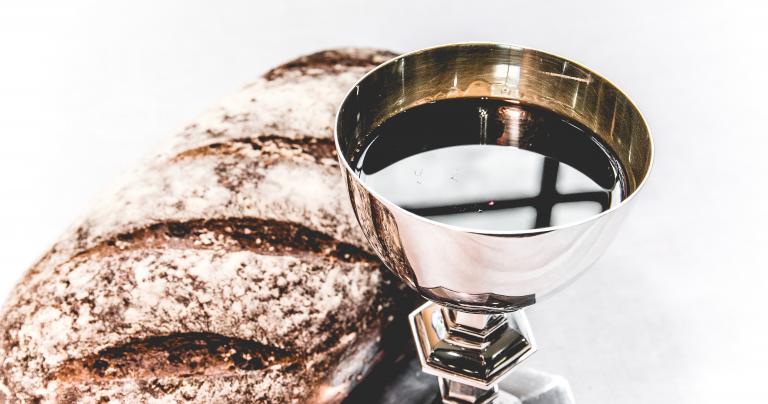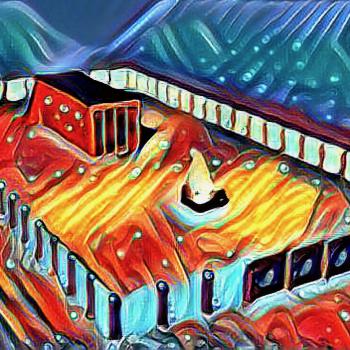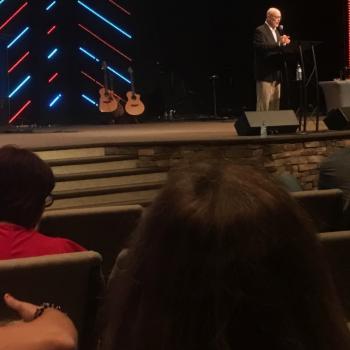Irenaeus may not offer a theology of re-calling but there is a mystery in the communion, an “invocation of God,” that changes either its meaning or our reception of it.
“Which was the more developed position on the role of the elements in conveying the presence of Christ in the Eucharist, Justin Martyr or Irenaeus?”[1]
There are a couple of considerations for this question. First of all, Irenaeus of Lyons is the student of Justin Martyr so it is possible that the thoughts of Irenaeus are simply a natural development of Justin’s work.
Secondly, while one can argue that Irenaeus writes more, and perhaps writes more articulately, Justin bears a great influence on both the Western and Eastern Churches.
Brief communion series:
Martin Luther, Justin Martyr, & Heidelberg at “The Table”

Irenaeus of Lyons
on Communion
We have considered the main contribution of Justin to the question at hand. Let us turn now to Irenaeus. In his work Against Heresies, he appeals to Christ as Lord incarnate. In that context he develops the meaning of the Eucharist, against Gnostics. Irenaeus primarily sees the Eucharist as a thanksgiving offering to the Creator, a firstfruits. He asks:
How will they allow that the bread over which thanksgiving has been said is the body of their Lord, and that the chalice is the chalice of his blood, if they say that he is not the son of the creator of the world; that is to say, his Word through whom the tree bears fruit and the fountains flow and the earth yields first the blade, then the ear, then the full corn in the ear?[2]
Is Irenaeus saying that Jesus is both Creator, and Re-Creator through the Eucharist? This seems to be a true Eucharist, a giving of thanks. Dom Gregory Dix reports:
He speaks of our Lord as “Instructing His disciples to offer to God the first-fruits of His own creation, not as though He had need of them, but that they themselves might be neither unfruitful nor grateful.”[3]
The Eucharist keeps the Primitive Church in check, as they regularly present offerings in gratitude for His work on the cross. So it is to Christ that they present their first-fruits – to Him who is the first-fruits of the new creation – when their laymen present the elements for the Eucharist.
Participating in the oblation
Irenaeus uses the term oblation or offering, and there seems to be two sides to it. First Christ offers his body and blood, symbolized in the bread and the wine, “the first-fruits of His own gifts in the New Covenant.”[4] Christ gives to us.
Second, “the church learning by tradition from the apostles, throughout all the world she offers to God.”[5] We give to Christ.
Irenaeus repeats the concept, “We ought to make oblation . . . offering firstfruits . . . offer unto Him what is His own.”[6] In this way we’re participating in some mysterious way in Christ’s sacrifice. Dix calls this an old tradition with “an emphasis on an authentic strain of primitive tradition.”[7]
Does the Spirit transform the elements or us?
Irenaeus may not offer a theology of re-calling but there is a mystery in the communion, an “invocation of God,” that changes either its meaning or our reception of it.
For as the bread of the earth, receiving the invocation of God, is no longer common bread but Eucharist, consisting of two things, an earthly and a heavenly; so also our bodies, partaking of the Eucharist, are no longer corruptible, having the hope of eternal resurrection.[8]
This may not be transubstantiation, but at the least it is a mystery or true blessing. Part of that mystery is not only recalling, but forward looking, an eschatological realization.
The question at hand
Which was the more developed position on the role of the elements in conveying the presence of Christ in the Eucharist, Justin or Irenaeus?
Justin’s thought seems to be formative for both the East and West. Irenaeus, a student of Justin, seems to expound upon Justin’s ideas and add to them, so his contribution is more developed. However, neither of them seem to have a fully developed doctrine of transubstantiation.
Majoring in minors
I have spent the last three weeks recounting some preliminary research I did while searching for some questions to chase about communion in the Primitive Church.
I soon found out that we are majoring on minors if we are looking for a well-developed doctrine on the transformation of the elements in that era, a doctrine we eventually began to refer to as transubstantiation.
In fact, in this research and the studies that followed these preliminary questions, I began to believe that the church did not develop the idea of transubstantiation at all until after about 300 A.D.
Therefore, perhaps we are asking the wrong question when we are wondering how our Lord is interacting with the elements at the table. Perhaps we should be asking whether or not our hearts are prepared to interact with Him.
Where does that leave us with the question at hand?
Is Christ somehow present in the elements?
Both Justin Martyr and Irenaeus of Lyons focus on Christ’s presence in another way, namely that He is somehow present with us.
We participate with his offering for us, by offering the elements before Him at the table. Therefore, the Primitive Church may have celebrated communion in a way that was reminiscent of the Hebrew wave offerings or thanksgiving offerings.
We somehow remember the cross and look forward to the moment when He meets us again at the table. In the Primitive Church there is always a blessing or mystery in both the recalling and in the eschatological hope of being reunited with Christ at His heavenly table.
As my studies progressed beyond the point of these articles I’m sharing with you now, I realized that the primitive invocations of the Holy Spirit at the table (epiklesis) are directed at transforming their hearts to receive from the Lord, more-so than transforming the elements.
And that is where I would like to conclude today. As with any spiritual practice, we are not focusing on a tangible outcome. We are focusing on positioning our soul to be receptive to our Lord.
Meet Jared

Rev. Jared Ingle
Pastor, Long Lake Friends Church
Facebook @longlakefriends
Director, JC Ingle, Inc.
Michigan nonprofit for ministry, supervised counseling, and conferences
231.714.4154
Traverse City, Michigan
Brief communion series:
Martin Luther, Justin Martyr, & Heidelberg at “The Table”
Other articles in the Category of Communion
notes:
[1] The professor asked this question as one of many options for us to choose from in a seminary course. Jared V. Ingle, “Question 5” (paper presented at Asbury Theological Seminary: Sacraments in History, Wilmore, KY, November 18, 2016).[2] Henry Bettenson and Chris Maunder, eds., Documents of the Christian Church, 4th ed. (New York, NY: Oxford University Press, 2011), 79.
[3-7] Dom Gregory Dix, The Shape of the Liturgy, 3rd ed. (New York, NY: Bloomsbury T&T Clark, 2015), 113-114.
[8] Bettenson, 80; see also Dix, 114, 137.












